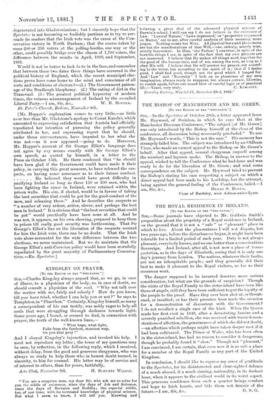THE ROYAL RESIDENCE IN IRELAND.
[To THE EDITOR OF THE "SPECTATOR."] SIR,—Some journals have objected to Mr. Goldwin Smith's proposition about the propriety of a Royal residence in Ireland, on the ground that it is not a " safe " or "pleasant" place in which to live. About the pleasantness I will not dispute, but two years ago, before the disturbances began, it might have been tolerable for a limited period of each year. Duty is not always pleasant, everybody knows, and no one better than a conscientious Sovereign. And Ireland, after all, is not now a place of trans- portation, as in the days of Elizabeth, seeing that it is only one day's journey from London. The natives, whatever their faults, are not an inhospitable people ; and they generally did their best to make it pleasant to the Royal visitors, as far as their resources went.
The danger supposed to be incurred deserves more serious consideration, but what are the grounds of suspicion ? Though the visits of the Royal Family to the sister-island have been like those of angels, still they have been sufficient to put the loyalty of the people to the proof. Have they ever been shot at, or threat- ened, or insulted; or has their presence been made the occasion for a demonstration of discontent with the Government P I do not recollect a single case of the kind. When the Queen made her first visit in 1849, after a devastating famine and a severely punished rebellion, she was received with warm demon- strations of affection, the genuineness of which she did not doubt, —an affection which perhaps might have taken deeper root, if it had been cultivated. The Prince of Wales, who has been often in the sister-island, has had no reason to consider it dangerous, though he probably found it "slow." Though not "pleasant," Jam convinced, I am certain, that even now it is as safe a place for a member of the Royal Family as any part of the United Kingdom.
In conclusion, I should like to express my sense of gratitude to the Spectator, for its disinterested and clear-sighted defence of a much abused, if a much sinning, nationality, in its darkest hour, when it appears to the civilised world in its worst aspect. This generous confidence from such a quarter brings comfort and hope to Irish hearts, and bids them not despair of the


































 Previous page
Previous page